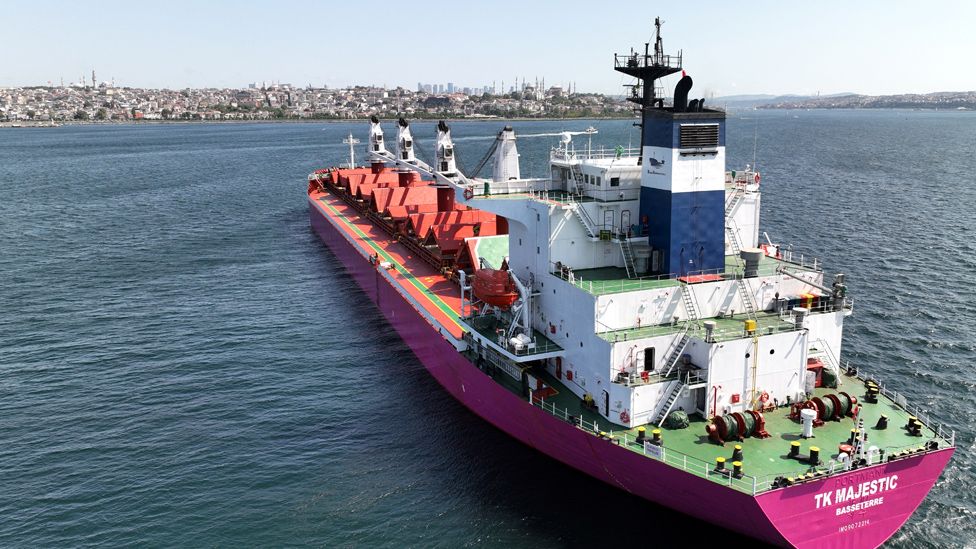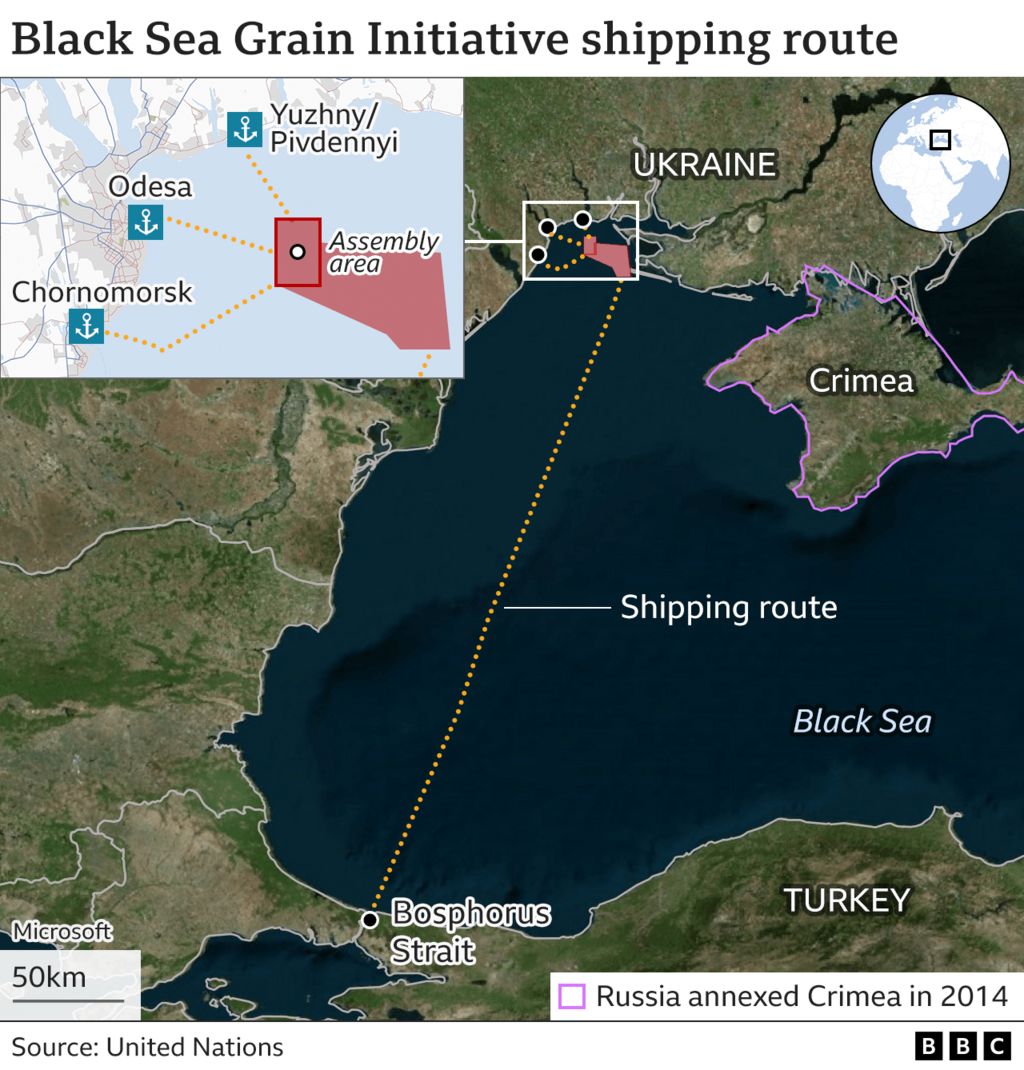
Russia's withdrawal from the deal allowing Ukraine to safely export grain through the Black Sea is a "stab on the back" for those in drought-hit countries, Kenya's government has said.
The country is in a region experiencing one of the worst droughts in decades.
Moscow said on Monday that it would not renew the deal, accusing the West of not keeping its side of the bargain.
The Russian blockade of Ukrainian ports last year threatened to cause food shortages in parts of Africa.
Grain prices also soared, but the deal, brokered in July 2022 by Turkey and the UN. allowed vital Ukrainian produce back on the world market.
Russia's decision was condemned by world leaders, who said it would affect some of the planet's poorest people.
Russia said it would return to the agreement if its conditions were met.
"The decision by Russia to exit the Black Sea Grain Initiative is a stab on [sic] the back at global food security prices and disproportionately impacts countries in the Horn of Africa already impacted by drought," Korir Sing'Oei the top civil servant in Kenya's foreign affairs ministry said in a tweet.
More than 50 million people across Somalia, Kenya, Ethiopia and South Sudan are in need of food aid because of successive years of failed rains.
Russia said that Ukraine's failure to export more grain to poorer countries was one of the reasons it pulled out of the deal.
However, the UN said that under the grain deal, Ukraine has shipped 625,000 tonnes of food as humanitarian aid to Afghanistan, Ethiopia, Kenya, Somalia, Sudan and Yemen.
The deal formally came to an end at just after midnight on Tuesday Istanbul time (21:00 GMT). It had let cargo ships pass through the Black Sea from the ports of Odesa, Chornomorsk and Yuzhny/Pivdennyi.
Russian President Vladimir Putin had long complained that parts of the deal allowing the export of Russian food and fertilisers had not been honoured.
Russia also complained that Western sanctions were restricting its own agricultural exports. Mr Putin repeatedly threatened to pull out of the agreement.
The country's foreign ministry on Monday reiterated these grievances, accusing the West of "open sabotage" and of "selfishly" putting the commercial interests of the deal ahead of its humanitarian goals.
But Turkish President Recep Tayyip Erdogan told reporters he believed that Mr Putin "wants to continue the agreement" and that they would discuss the renewal of the deal when they meet in person next month.
The grain deal is important as Ukraine is one of the world's largest exporters of sunflower, maize, wheat and barley.
Ukrainian President Volodymyr Zelensky said his country intended to continue exporting grain, highlighting that the agreement was made up of two deals that mirrored each other - one signed by Ukraine and the other by Russia.
"We are not afraid," he said of Russia's decision to withdraw from their deal.
"We were approached by companies who own vessels and they're willing to continue shipping grain if Ukraine agrees to let them in and Turkey - to pass them through."
Mykhaylo Podolyak, an adviser to Mr Zelensky, suggested an international armed patrol force could be created to escort ships carrying grain from Ukraine and ensure their safety.
He admitted, however, that there may not be many countries willing to create such patrols.
Nikolay Gorbachev, the president of the Ukrainian Grain Association, told the BBC that his members had identified alternative means of exporting grain - including through its Danube River ports.
But he conceded that the ports would be less efficient, reducing the amount of grain Ukraine can export and raising the cost of moving it.
World leaders were quick to condemn the decision, with EU commission President Ursula von der Leyen accusing Russia of a "cynical move", while the US ambassador to the United Nations, Linda Thomas-Greenfield, described the move as an "act of cruelty".
Ngozi Okonjo-Iweala, who heads the World Trade Organization (WTO) said Black Sea trade in food, feed and fertiliser was "critical to the stability of global food prices" - adding that hope must be kept alive that Moscow would reconsider pulling out of the deal.
UN Secretary General Antonio Guterres, meanwhile, said the organisation would look for solutions to the "rise in human suffering" that would "inevitably" follow Russia's decision.
"There is simply too much at stake in a hungry and hurting world," said Mr Guterres.
The Kremlin's announcement came just hours after an attack on a bridge in Crimea that killed two civilians. Ukraine has not officially claimed responsibility but a source in the country's security service told BBC Russian it was behind the attack.
Mr Peskov said Russia letting the deal expire was unrelated to the attack. "Before this attack, the position was declared by President Putin", he told reporters in Moscow.

Related Topics
"Exit" - Google News
July 18, 2023 at 05:53PM
https://ift.tt/l0bK5J3
Russia's grain deal exit is a stab in the back - Kenya - BBC
"Exit" - Google News
https://ift.tt/cOUzxmZ
https://ift.tt/SbLoJ4A
Bagikan Berita Ini














0 Response to "Russia's grain deal exit is a stab in the back - Kenya - BBC"
Post a Comment